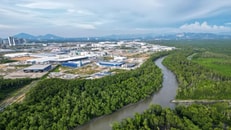Address systemic change not ‘Net Zero hero’ warns Australia
The energy sector is creating a myth that individual action is enough to address climate change, University of Sydney research claims.
Analysis of hundreds of public reports and media releases from the Australian energy sector identified a common story of the ‘Net Zero hero’, a consumer who, through careful choices, becomes a champion in the fight against climate change.
“Our research found this idea was constantly perpetuated by players across the energy sector,” said Associate Professor Tom van Laer from the University of Sydney Business School. “If consumers buy the right car, switch off their appliances, use off-peak hot water, install solar panels – you name it – then they can play a key role in saving the planet. If they can just understand, monitor and manage their energy consumption, they can really make the difference. It’s a nice story, but it ignores the bigger picture of the corporate and regulatory changes that are essential to address this issue.”
Associate Professor van Laer analysed material published between 2015-2022 on the websites of 44 Australian energy market players, including energy providers, non-government organisations and policy makers. His findings have been published in the Journal of Public Policy & Marketing.
... to continue reading you must be subscribed
























